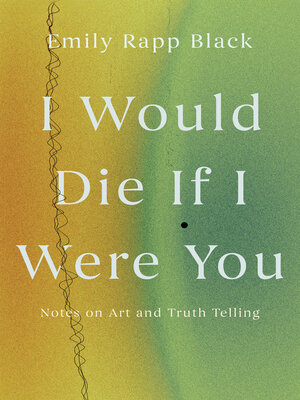
Sign up to save your library
With an OverDrive account, you can save your favorite libraries for at-a-glance information about availability. Find out more about OverDrive accounts.
Find this title in Libby, the library reading app by OverDrive.



Search for a digital library with this title
Title found at these libraries:
| Library Name | Distance |
|---|---|
| Loading... |
Brilliant, anti-ableist, and with a strongly feminist perspective, these essays grapple with how to cultivate a creative, vibrant, and joyful life without succumbing to the pressures of productivity that run counter to the richness and life-giving, spirit-lifting potential of the creative act
For her entire life, celebrated memoirist Emily Rapp Black has been answering awkward questions in elevators: What’s wrong with you? What happened to your body? And, in the case of her son’s terminal illness and death, she’s been told more times than she can count: “I would die if I were you.”
Black rejects the idea of easy pity. Learning how to reframe some of the most difficult experiences a person can live through, alchemizing pain into truth and meaning, she discovered, is its own kind of terrible beauty. Part of the human project is to experience grief and loss, and nobody gets out alive, and no writer—or person—survives anything alone. We need empathy, and for that we need community, and we need stories told within them.
As someone who writes and teaches books about loss and grief, two very loaded and universal subjects, Black wanted to write a book that would empower readers with “conversation stopping” stories (she lose her leg, her child died, in her case) to tell their stories in a way that can be salvific for those who may have been forced to live a similar story. Based on two decades of teaching a wide range of students with diverse and difficult experiences, I Would Die If I Were You is designed to help creative people approach their “hard’ stories in a way that feels joyful, redemptive, and meaningful.
There’s an old saying that when a character is put under extreme duress or pressure, their true character emerges. Black believes this is the same for people, and that writers who have these often extraordinary experiences needed new strategies to tell the stories, those that liberate them from the “poor sad person with a poor sad story” assumption.
For her entire life, celebrated memoirist Emily Rapp Black has been answering awkward questions in elevators: What’s wrong with you? What happened to your body? And, in the case of her son’s terminal illness and death, she’s been told more times than she can count: “I would die if I were you.”
Black rejects the idea of easy pity. Learning how to reframe some of the most difficult experiences a person can live through, alchemizing pain into truth and meaning, she discovered, is its own kind of terrible beauty. Part of the human project is to experience grief and loss, and nobody gets out alive, and no writer—or person—survives anything alone. We need empathy, and for that we need community, and we need stories told within them.
As someone who writes and teaches books about loss and grief, two very loaded and universal subjects, Black wanted to write a book that would empower readers with “conversation stopping” stories (she lose her leg, her child died, in her case) to tell their stories in a way that can be salvific for those who may have been forced to live a similar story. Based on two decades of teaching a wide range of students with diverse and difficult experiences, I Would Die If I Were You is designed to help creative people approach their “hard’ stories in a way that feels joyful, redemptive, and meaningful.
There’s an old saying that when a character is put under extreme duress or pressure, their true character emerges. Black believes this is the same for people, and that writers who have these often extraordinary experiences needed new strategies to tell the stories, those that liberate them from the “poor sad person with a poor sad story” assumption.







